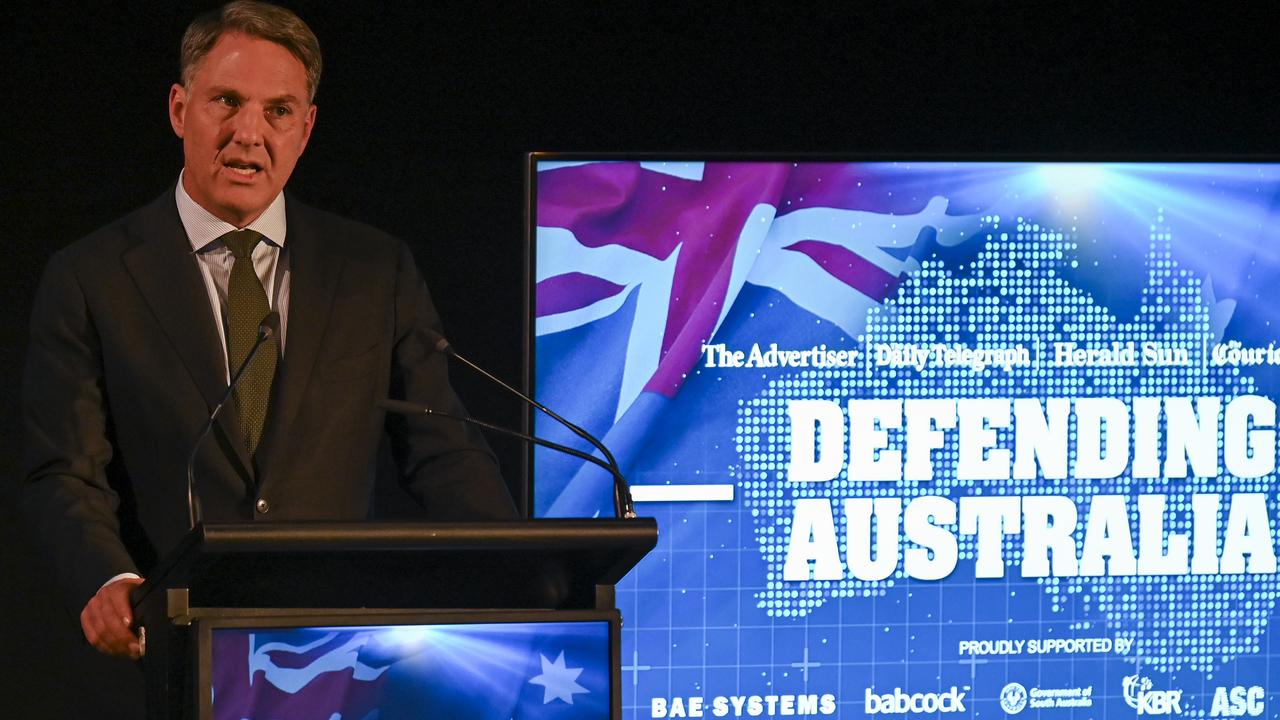[ad_1] Australia must confront the “inconvenient truths” about China’s positive contributions to the world, while also countering Beijing’s “massive
[ad_1]
Australia must confront the “inconvenient truths” about China’s positive contributions to the world, while also countering Beijing’s “massive” military expansion threatening regional security, Richard Marles says.
The Defence Minister condemned “shrill and fundamentalist” inflammatory commentary about China, while also acknowledging the country was a significant source of “anxiety” for our own national security.
Addressing News Corp’s Defending Australia dinner on Monday night, Mr Marles outlined a complex view of China, lauding the Chinese Communist Party for lifting its country out of poverty, while also raising concerns about its human rights abuses and secretive military build-up.
The nation’s top military brass, Opposition Leader Peter Dutton, US Ambassador Caroline Kennedy, UK High Commissioner Vicki Treadell and South Australian Premier Peter Malinauskas were among the high-profile dignitaries at the event held at the War Memorial in Canberra.
Mr Marles said China remained “at the heart of our economic growth,” but raised concerns about the construction of artificial islands in the South China Sea, labelling Beijing a “significant source of anxiety” for Australia’s national security.
“Most of our trade goes through that body of water, including all of our trade to Japan and Korea, two of our top five trading partners,” he said.
“This is an example of how China has, over the last decade, sought to shape the world around it in a way it has not done before.”
Mr Marles delivered a sharp rebuke of the previous government, criticising the Coalition for unnecessarily inflaming tensions with China for the sake of “short-term electoral interest”.
“These actions made our already deeply complex relationship with China much harder,” he said.
“Indeed it is hard to imagine a relationship less suited to simplistic platitudes.”
Mr Marles said managing the fraught relationship with Beijing was difficult and could not be done on “fundamentalist terms”.
“It must be possible to say that we value a productive relationship with China. Because quite obviously, China matters,” he said.
Mr Marles said Australia’s defence spending would grow over the next 10 years, but warned the “grey zone” of modern conflicts made deciding the size of that investment “far more complicated than in the past”.
Mr Dutton also spoke at the event, warning against the government relying too heavily on diplomacy to protect the nation against China’s rapid military expansion.
“Diplomacy is paramount and must never be neglected, but we must also be realistic lest we risk drifting into wishful thinking that diplomacy can always save the day,” he said.
“We must put the accelerator down on defence deterrence.”
Opposition defence spokesman Andrew Hastie said AUKUS and other defence projects were “multi-generational,” meaning it was important both sides of politics engaged in major events like Defending Australia.
“It’s really important we have leadership from across defence, government, the civilian sector and from across the Pacific,” he said.
Mr Malinauskas said the presence of Ms Kennedy and Ms Treadell showed a “demonstration” of the AUKUS partners’ confidence in the nuclear submarine program.
“Obviously having Ambassador Kennedy here speaks to just how seriously their respective governments are about this partnership,” Mr Malinauskas said.
Ms Treadell said it was important “like-minded” countries worked together in a world that currently “seems a little less stable”.
“We all want an open, free, stable Indo-Pacific, as well as transatlantic,” she said.
“What goes on in the transatlantic is indivisibly linked to what goes on in the region and vice versa.”
AUKUS nuclear-powered submarine taskforce chief, Vice Admiral Jonathan Mead, said the Defending Australia event was held amid an “unbelievable time in Australia’s history” as the country embarks on an unprecedented defence project.
“There are a lot of glass ceilings that we need to break,” Vice Admiral Mead said.
“It’s great that we can now publicly talk about the optimal pathway … a lot lies ahead of us but our partners are committed, everyone in Australia is committed.”
Vice Admiral David Johnston said following the Defence Strategic Review the ADF had a “clear direction” to ensure the nation’s capability was “fit-for-purpose in addressing the challenges of the day and into the future”.
The heads of some of the country’s biggest defence companies including BAE Systems, Babcock, KBR and ASC, as well as Australian National University Vice Chancellor Brian Schmidt, were among the guests at the event.
Originally published as ‘Good guy, bad guy’ China a battle we must face, according to Defence Minister Richard Marles
[ad_2]
Source link



COMMENTS